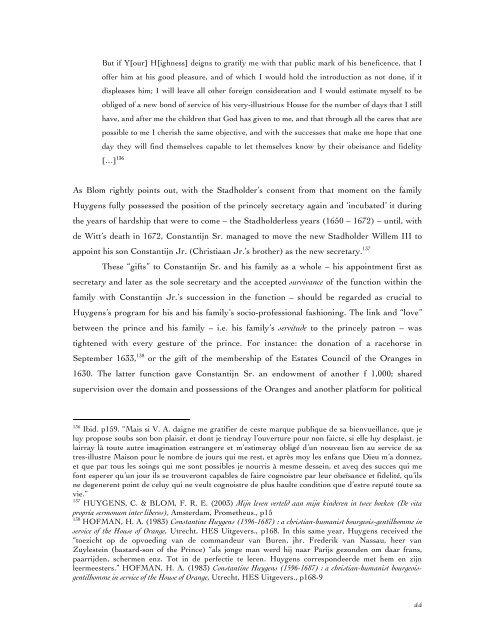Christiaan Huygens – A family affair - Proeven van Vroeger
Christiaan Huygens – A family affair - Proeven van Vroeger
Christiaan Huygens – A family affair - Proeven van Vroeger
Create successful ePaper yourself
Turn your PDF publications into a flip-book with our unique Google optimized e-Paper software.
But if Y[our] H[ighness] deigns to gratify me with that public mark of his beneficence, that I<br />
offer him at his good pleasure, and of which I would hold the introduction as not done, if it<br />
displeases him; I will leave all other foreign consideration and I would estimate myself to be<br />
obliged of a new bond of service of his very-illustrious House for the number of days that I still<br />
have, and after me the children that God has given to me, and that through all the cares that are<br />
possible to me I cherish the same objective, and with the successes that make me hope that one<br />
day they will find themselves capable to let themselves know by their obeisance and fidelity<br />
[…] 136<br />
As Blom rightly points out, with the Stadholder’s consent from that moment on the <strong>family</strong><br />
<strong>Huygens</strong> fully possessed the position of the princely secretary again and ‘incubated’ it during<br />
the years of hardship that were to come <strong>–</strong> the Stadholderless years (1650 <strong>–</strong> 1672) <strong>–</strong> until, with<br />
de Witt’s death in 1672, Constantijn Sr. managed to move the new Stadholder Willem III to<br />
appoint his son Constantijn Jr. (<strong>Christiaan</strong> Jr.’s brother) as the new secretary. 137<br />
These “gifts” to Constantijn Sr. and his <strong>family</strong> as a whole <strong>–</strong> his appointment first as<br />
secretary and later as the sole secretary and the accepted survi<strong>van</strong>ce of the function within the<br />
<strong>family</strong> with Constantijn Jr.’s succession in the function <strong>–</strong> should be regarded as crucial to<br />
<strong>Huygens</strong>’s program for his and his <strong>family</strong>’s socio-professional fashioning. The link and “love”<br />
between the prince and his <strong>family</strong> <strong>–</strong> i.e. his <strong>family</strong>’s servitude to the princely patron <strong>–</strong> was<br />
tightened with every gesture of the prince. For instance: the donation of a racehorse in<br />
September 1633, 138 or the gift of the membership of the Estates Council of the Oranges in<br />
1630. The latter function gave Constantijn Sr. an endowment of another f 1,000; shared<br />
supervision over the domain and possessions of the Oranges and another platform for political<br />
136 Ibid. p159. “Mais si V. A. daigne me gratifier de ceste marque publique de sa bienvueillance, que je<br />
luy propose soubs son bon plaisir, et dont je tiendray l’ouverture pour non faicte, si elle luy desplaist, je<br />
lairray là toute autre imagination estrangere et m’estimeray obligé d’un nouveau lien au service de sa<br />
tres-illustre Maison pour le nombre de jours qui me rest, et après moy les enfans que Dieu m’a donnez,<br />
et que par tous les soings qui me sont possibles je nourris à mesme dessein, et aveq des succes qui me<br />
font esperer qu’un jour ils se trouveront capables de faire cognoistre par leur obeïsance et fidelité, qu’ils<br />
ne degenerent point de celuy qui ne veult cognoistre de plus haulte condition que d’estre reputé toute sa<br />
vie.”<br />
137 HUYGENS, C. & BLOM, F. R. E. (2003) Mijn leven verteld aan mijn kinderen in twee boeken (De vita<br />
propria sermonum inter liberos), Amsterdam, Prometheus., p15<br />
138 HOFMAN, H. A. (1983) Constantine <strong>Huygens</strong> (1596-1687) : a christian-humanist bourgeois-gentilhomme in<br />
service of the House of Orange, Utrecht, HES Uitgevers., p168. In this same year, <strong>Huygens</strong> received the<br />
“toezicht op de opvoeding <strong>van</strong> de commandeur <strong>van</strong> Buren, jhr. Frederik <strong>van</strong> Nassau, heer <strong>van</strong><br />
Zuylestein (bastard-son of the Prince) “als jonge man werd hij naar Parijs gezonden om daar frans,<br />
paarrijden, schermen enz. Tot in de perfectie te leren. <strong>Huygens</strong> correspondeerde met hem en zijn<br />
leermeesters.” HOFMAN, H. A. (1983) Constantine <strong>Huygens</strong> (1596-1687) : a christian-humanist bourgeoisgentilhomme<br />
in service of the House of Orange, Utrecht, HES Uitgevers., p168-9<br />
44


